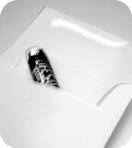“AMERICANS SHOULD watch what they say” took on new meaning last week, after Seattle police responded to a panicked call from KIRO-TV about an envelope spilling white powder on the news-assignment desk, with “Anthrax, FL” written in the upper left corner. Before they arrived, another call came from KIRO -TV saying, according to the police report, “[I]t was all a joke perpetrated by an employee.” But “officers decided that, in light of current events, the call would not be canceled and the investigation would continue.”
And how. Officers reported that after they announced they’d “start the haz-mat protocol”—hose downs in the parking lot?—TV assignment editor Bryan Thielke admitted leaving crushed peppermint Life Savers in the offending envelope. They urged charging him with “threats to bomb or injure property,” a felony, and misdemeanor “false reporting” and “harassment” (apparently because another employee felt “physically ill” upon hearing of the powder). The Seattle Post-Intelligencer named Thielke, despite its usual scruples against naming uncharged suspects: Assistant metro editor Bill Miller says the seriousness of terrorism issues; the fact that police say Thielke, who didn’t talk to the P-I, confessed; and his status as a member of the media all weighed in the decision.
The next day, P-I columnist Candy Hatcher gnawed over this “stupid and mean” prank in predictable fashion. KIRO-TV reporter Kevin McCarty meanwhile posted a letter on two trade sites, www.newsblues.com and www.shoptalk.com, defending this “well-respected” veteran editor and telling more of the story: “The crushed mint was left in an area where we all place jokes, pictures, and articles. [Newsrooms, especially TV ones, are havens of graveyard humor; it goes with the job.] It was there BEFORE the NBC anthrax infection. It sat unnoticed for days as people worked around it without fear. No one, repeat, no one at the assignment desk or in the newsroom EVER took it seriously. Someone from outside the newsroom did.” And the suspect didn’t write “Anthrax, FL”: “Someone else did, adding to what most thought was a twisted little joke.” Bust that pseudo terrorist, too!
Indeed, according to the police report (and contrary to the P-I story), the witness who first reported the envelope, triggering the police call, actually saw it four days earlier and didn’t mention it then. McCarty claims that police, “after threatening to vigorously pursue the case,” left the white powder behind in the newsroom. A police representative disputes that: “Evidence was collected.”
All this sounds eerily like Seattle’s other famous terrorism scare, back before there were terrorists on the horizon: July 15, 1996, when the guerrilla artist formerly known as Subculture Joe dumped his old pickup and familiar “Heart” sculpture in Westlake Park. Police first wrote a parking ticket, then, noticing “The Bomb!” (as in “Cool!”) written on the bumper, shut down downtown and sent in an anti-bomb robot. Prosecutors talked tough, charged Subculture Joe with the same bomb-threat felony, locked him up for a month—and then quietly dropped charges.
This silly case will likewise blow away; here’s hoping the watchdogs stop posturing sooner this time. Doubtless the cops are tired of chasing white-powder false alarms; maybe they wanted to make an example. But we’re really in trouble if dumb jokes become felonies. Imagine the vendetta opportunities: Claim you saw white powder in your neighbors’ garbage and get them busted as pseudo terrorists.
SHOOTING GEORGE ORWELL
So will Susan Paynter get busted for confessing, in the same Friday P-I, to joking Emily Litella-style: “What’s all this I hear about nasal s’mores?” Paynter reminded readers that, even in these times, you gotta laugh about something. And the P-I obligingly provided that something: an inspired headline on the same issue’s op-ed page, “Shooting the Rouge [sic] Elephant.” That blooper’s nothing compared to the way The Washington Post big shot Jim Hoagland, in the column under that headline, misreads George Orwell’s famous essay “Shooting an Elephant.” Hoagland recounts how Orwell, as a colonial policeman, overcame the natives’ ridicule and shot an elephant that represented “a real threat to him and the village.” Likewise, America must ignore “Arab and other regimes that wield the sword of shame” and press on and “shoot the [Al Qaeda] rogue elephant.”
Orwell actually reported the opposite: The elephant, having exited a hormone- induced fit, was peaceful; he didn’t want or need to shoot it, and did so only to avoid embarrassment. “I first grasped the hollowness, the futility of the white man’s dominion in the East,” writes Orwell. “I perceived in this moment that when the white man turns tyrant it is his own freedom that he destroys.” If Orwell is a prophetic guide to our current predicament, as Hoagland claims, then he’s not telling us to rush to battle. Misappropriating literary icons and misrepresenting classic texts like this is just what we slam the Taliban, Wahhabites, and Osama bin Laden for doing with the Quran.








